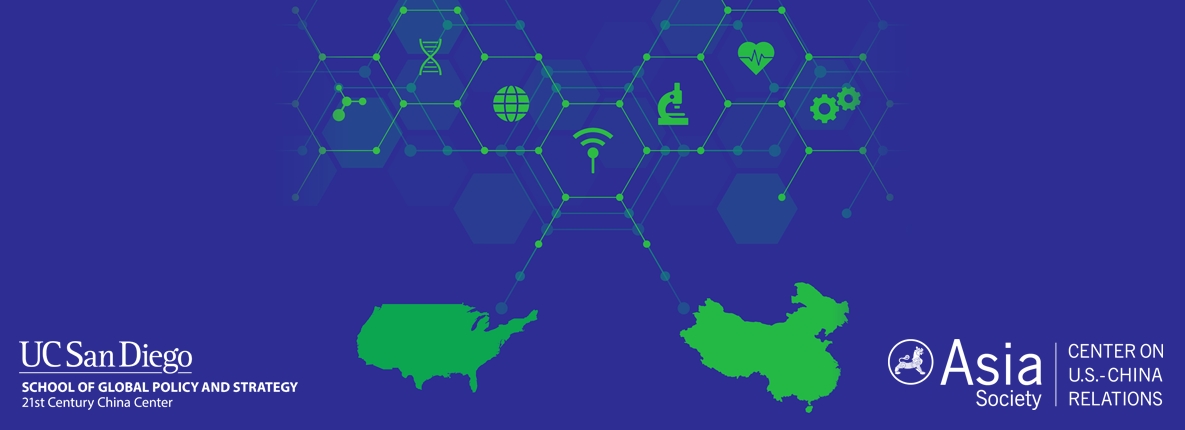Policy
- Analysis
- China Forum
- China's SOEs and the Low-Carbon Transition
- Task Force
- Science and Technology
 Working Group on Science and Technology in U.S.-China Relations
Working Group on Science and Technology in U.S.-China RelationsIs China or the U.S. ahead in artificial intelligence? What is the best way to counter security threats in 5G technology? How do we best maintain American leadership positions in fundamental research and biotechnology?
A new policy report on "Meeting the China Challenge: A New American Strategy for Technology Competition" is the culmination of over a full year’s deliberation and study by the bipartisan Working Group on Science and Technology in U.S.-China Relations. It sets forth broad policy objectives as well as specific recommendations for the new U.S. administration in four domains of science and technology: fundamental research, 5G digital communications, artificial intelligence and biotechnology.
The Working Group is organized by the 21st Century China Center at the UC San Diego School of Global Policy and Strategy and the Asia Society Center on U.S.-China Relations. It operates under the auspices of the Task Force on U.S.-China Policy. It comprises twenty-nine leading experts on China and science and technology issues from the academia, industry and think tanks in the U.S. and is chaired by Dean Peter Cowhey, a leading technology policy expert.
Report Launch & Press Conference
Meeting the China Challenge: A New American Strategy for Technology Competition
Nov. 16, 2020
Questions about a new strategy for U.S.-China competition in science and technology were addressed in the press conference on Nov. 16 as we launched a policy report on "Meeting the China Challenge: A New American Strategy for Technology Competition."
Exclusive: Congress urged to ease immigration for foreign science talent
May 9, 2022, Report mentioned in Axios
Anti-Asian Atmosphere Chills Chinese Scientists Working in the U.S.
April 26, 2021, Bloomberg Businessweek
The Danger of Exaggerating China’s Technological Prowess
Jan. 8, 2021, Peter Cowhey and Susan Shirk in The Wall Street Journal [PDF]
美國需要自我療傷,但更有智慧的策略是繼續開放
Nov. 30, 2020, Susan Shirk interviewed by Initium Media (in Chinese)
Report Unveils Strategy for U.S. Tech Competition With China
Nov. 24, 2020, Peter Cowhey and Susan Shirk mentioned in Communications of the ACM
Ex-officials close to Biden suggest US co-operate with, not confront, China
Nov. 20, 2020, Susan Shirk mentioned in iTWire
Biden Will Throw in the Towel on China Tech War
Nov. 19, 2020, Susan Shirk mentioned in PJ Media
Top minds appeal to Joe Biden to reboot US tech policy on China
Nov. 18, 2020, Report coverage in South China Morning Post
How Can the U.S. Maintain Global Leadership in Science and Technology?
Nov. 18, 2020, Working Group members' essays in ChinaFile
Biden’s China Policy? A Balancing Act for a Toxic Relationship
Nov. 17, 2020, Peter Cowhey quoted in The New York Times
New U.S. Strategy Unveiled for a Smart Competition with China in Science and Tech
Nov. 16, 2020, Report coverage in UC San Diego News
‘Decoupling’ the U.S. from China would backfire
Sept. 8, 2020, Working Group members quoted in The Washington Post op-ed
Charlene Barshefsky, Senior International Partner at WilmerHale
Arthur Bienenstock, Professor of Photon Science, Emeritus and former Vice Provost and Dean of Research, Stanford University
Jessica Chen Weiss, Associate Professor of Government, Cornell University
Tai Ming Cheung, Director, UC Institute on Global Conflict and Cooperation, UC San Diego
Mark Cohen, Director, UC Berkeley Center for Law and Technology
Peter Cowhey, Dean, UC San Diego School of Global Policy and Strategy
Wendy Cutler, Vice President, Asia Society Policy Institute
Robert Daly, Director, Kissinger Institute on China and the U.S., Wilson Center
Karl Eikenberry, Former U.S. Ambassador to Afghanistan and Lieutenant General, U.S. Army, Retired
Robert Friedman, Vice President for Policy and University Relations, J. Craig Venter Institute
Melanie Hart, Senior Fellow and Director of China Policy, Center for American Progress
Yasheng Huang, Epoch Foundation Professor of International Management, MIT Sloan School of Management
Elsa Kania, Adjunct Senior Fellow, Technology and National Security Program, Center for a New American Security
Arthur Kroeber, Partner and Head of Research, Gavekal and founder, Gavekal Dragonomics
Eric Loeb, EVP Government Affairs, Salesforce
Anja Manuel, Co-Founder and Principal, Rice, Hadley, Gates & Manuel LLC
Jason Matheny, Director, Center for Security & Emerging Technology, Georgetown University
Evan Medeiros, Penner Family Chair in Asian Studies and Cling Family Distinguished Fellow in U.S.-China Studies, Walsh School of Foreign Service, Georgetown University
Peter Michelson, Professor of Physics & Luke Blossom Professor in the School of Humanities and Sciences, Stanford University
Barry Naughton, So Kwan Lok Chair and Professor, UC San Diego School of Global Policy and Strategy
Samm Sacks, Cyber Policy Fellow, New America; and Senior Fellow, Yale Law School Paul Tsai China Center
Orville Schell, Arthur Ross Director, Center on U.S.-China Relations, Asia Society
Andrew “Drew” Senyei, Managing Director, Enterprise Partners Venture Capital
Susan Shirk, Research Professor and Chair, 21st Century China Center, UC San Diego School of Global Policy and Strategy
Helen Toner, Director of Strategy at Center for Security and Emerging Technology, Georgetown University
Ken Wilcox, Emeritus Chairman, Silicon Valley Bank
Robert Work, Distinguished Senior Fellow for Defense and National Security, Center for a New American Security, and former Deputy Secretary of Defense
Keith Yamamoto, Professor & Vice Chancellor for Science Policy and Strategy, UC San Francisco